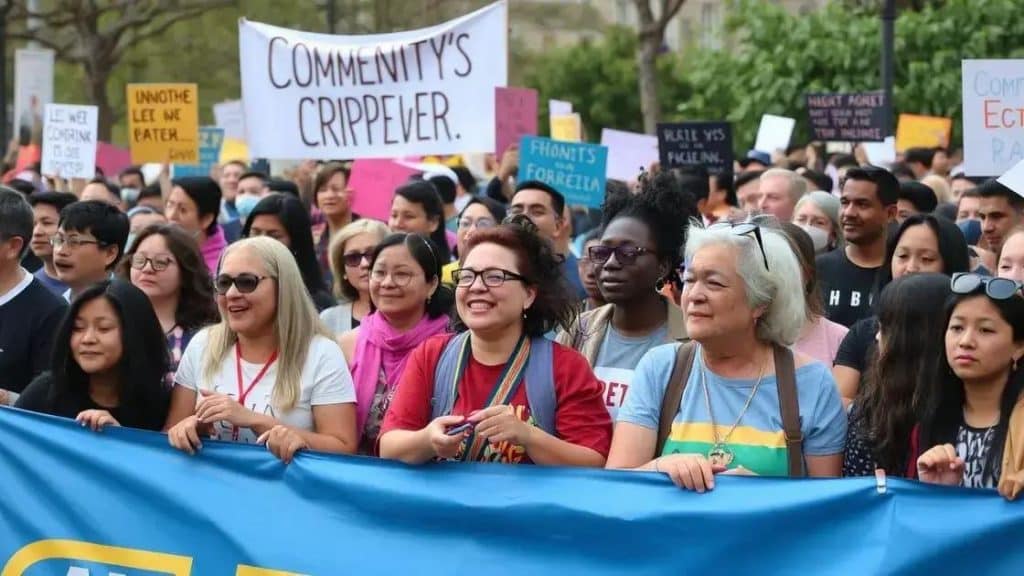Forward political campaign focus: strategies for success

Effective political campaigns require understanding the landscape, engaging voters through innovative strategies, measuring success with key metrics, and adapting approaches based on feedback to enhance their chances of success.
Forward political campaign focus is becoming essential for candidates aiming to resonate with voters. As the political climate shifts, it’s crucial to adapt and embrace effective strategies that capture attention. Curious about how to enhance your campaign? Let’s dive in.
Understanding the current political landscape
Understanding the current political landscape is crucial for crafting a successful campaign. Today, voters are more informed and engaged than ever before. The key to tapping into this engagement is recognizing the trends that shape public opinion.
Key Trends to Consider
Several critical trends define today’s political climate. By focusing on these aspects, candidates can better relate to their audience and tailor their messages accordingly.
- Social Media Influence: Platforms like Twitter and Facebook are now primary sources of news for many voters.
- Voter Demographics: Understanding the changing demographics, including age, race, and socioeconomic status, is essential.
- Political Polarization: The divide among political views continues to widen, affecting how campaigns communicate their messages.
- Issues That Matter: Key topics such as climate change, healthcare, and economic inequality resonate deeply with the electorate.
With these trends in mind, it’s important to engage with the public authentically. Candidates should create voices that resonate personally with voters. Research shows that when voters feel connected to candidates, their likelihood of support increases significantly.
Strategies for Engagement
Innovative strategies can enhance connections between candidates and voters. Campaigns should focus on building relationships through community involvement and direct outreach.
For example, town hall meetings allow candidates to interact with constituents directly. These events create a platform for open discussion, fostering trust and transparency.
Moreover, utilizing digital tools can facilitate further engagement. Regular updates via social media keep voters informed and involved.
Ultimately, understanding the current political landscape requires adaptability. By staying informed and actively listening to voters’ needs, campaigns can position themselves effectively for success.
Key elements of a successful campaign
Key elements of a successful campaign are essential for achieving political goals. Every campaign should consider strategies that effectively connect with voters and convey clear messages.
Components of a Winning Campaign
Successful campaigns often share common ingredients that resonate with the electorate.
- Clear Messaging: A campaign must articulate its message effectively. Voters need to understand the candidate’s vision and priorities without confusion.
- Strong Branding: Creating a recognizable brand helps distinguish a candidate in a crowded field. This includes a memorable logo and consistent imagery across materials.
- Targeted Outreach: Knowing your audience is crucial. Tailoring messages and outreach methods to specific voter demographics can enhance engagement.
- Effective Fundraising: Fundraising is the backbone of any campaign. Adequate resources enable outreach, advertising, and events that are vital for visibility and influence.
Building a strong team is also critical. Campaign staff should be skilled and aligned with the campaign’s vision to ensure smooth operations and strategic implementation. Coordination among team members enhances efficiency and boosts morale.
In addition to having a reliable team, leveraging digital tools can amplify the campaign’s reach. Social media platforms allow for real-time engagement with voters, creating a dialogue that is both informative and interactive.
Mobilizing Supporters
Engaging and mobilizing supporters is key. Campaigns should encourage volunteer participation and community involvement. Volunteers can help canvas neighborhoods, distribute materials, and organize events, maximizing outreach efforts.
Creating events that foster excitement and community connection can also drive participation. Rallies, town halls, and meet-and-greets provide opportunities for candidates to directly interact with voters, showing their commitment to addressing community issues.
Ultimately, the combination of these elements establishes a solid foundation for campaign success. By focusing on clear messaging, strong branding, targeted outreach, and mobilizing supporters, a campaign can significantly enhance its chance for a positive outcome.
Innovative approaches to engage voters

Innovative approaches to engage voters are essential to any successful campaign. As traditional methods become less effective, candidates must explore new ways to connect with their audience.
Utilizing Technology
Technology can bridge the gap between candidates and voters. For example, using mobile apps allows supporters to interact directly with campaigns. These apps can provide updates, event notifications, and even polling features.
- Interactive Social Media: Engaging posts and live sessions on platforms like Instagram and Facebook can foster a community feel.
- Virtual Town Halls: Hosting town halls online opens up discussions with a broader audience, making it easier for people to participate.
- Text Message Campaigns: Sending updates and reminders via text ensures information reaches voters quickly and efficiently.
Engaging content is another way to capture attention. Creative videos, compelling stories, and infographics convey messages effectively. A strong visual presence helps to keep voters informed and interested.
Community Engagement Strategies
Building community relationships is vital. Organizing local events allows candidates to connect with voters personally. These interactions foster trust and aid in understanding the community’s needs.
Additionally, empowering volunteers to take part in the campaign creates a sense of ownership among supporters. They become advocates in their neighborhoods, amplifying the campaign’s message through word of mouth.
Moreover, listening to the electorate plays a crucial role. Surveys and feedback forms help candidates gauge voter concerns and preferences, ensuring the campaign stays aligned with what truly matters to the public.
By adopting these innovative approaches, campaigns can create meaningful connections that extend beyond the election. Engaging voters effectively not only informs but also empowers them to take part in the political process.
Utilizing social media effectively
Utilizing social media effectively is crucial for modern political campaigns. With millions of users online, platforms like Facebook, Twitter, and Instagram offer unique opportunities to connect with voters.
Creating Engaging Content
To capture attention, campaigns must develop engaging content. This includes using images, videos, and live streams that resonate with the audience.
- Storytelling: Sharing personal stories or testimonials can make the campaign feel relatable and genuine.
- Visual Graphics: Infographics and visually appealing posts can simplify complex issues, making them easier for voters to understand.
- Interactive Posts: Polls, quizzes, and questions invite followers to participate and share their opinions.
Additionally, posting at strategic times enhances visibility. Analyzing when the audience is most active allows campaigns to schedule posts effectively, increasing engagement rates.
Building a Community
Social media is not just about broadcasting messages; it’s also about building a community. Responding to comments and messages creates a two-way conversation. This interaction fosters trust and makes supporters feel valued.
Using social media influencers can amplify a campaign’s reach. Partnering with popular figures who align with the campaign’s values can introduce messages to broader audiences.
Moreover, consistent branding across all channels ensures that the campaign’s identity remains strong. A recognizable logo and cohesive visual style help voters remember the candidate amidst the noise of the election cycle.
Finally, tracking metrics is vital to measure the effectiveness of social media strategies. Analyzing engagement, reach, and conversion rates helps refine approaches and improve future outreach efforts, ensuring that campaigns adapt to changing voter preferences.
Measuring campaign success and adjusting strategies
Measuring campaign success and adjusting strategies is vital for any political campaign. Tracking the right metrics can provide insights into what works and what needs improvement.
Key Metrics to Track
Campaigns should focus on several key performance indicators (KPIs) to assess effectiveness.
- Voter Engagement: This includes likes, shares, comments, and overall interaction on social media posts.
- Website Traffic: Monitoring how many visitors your campaign website gets can help gauge interest and outreach effectiveness.
- Fundraising Numbers: Tracking how much money is raised, and from which sources, reveals donor interest and confidence.
- Poll Results: Regularly checking internal polls provides insights into public opinion and shifts in voter sentiment.
By analyzing these metrics, campaigns can determine if their messaging resonates with voters. If certain strategies are falling flat, it might be time to pivot and try new approaches.
Adjusting Strategies
When the data indicates a need for change, campaigns must adjust their strategies accordingly. This may involve refining messaging, changing the target audience, or reallocating resources to more effective areas.
For instance, if engagement is low on social media, campaigns might increase visual content or utilize video formats to grab attention. They could also experiment with different posting times to reach a more active audience.
Moreover, direct voter feedback can provide invaluable information. Surveys or focus groups help identify areas of concern or interest, allowing campaigns to adapt messaging to align with voter priorities.
Ultimately, the ability to measure and adapt is what sets successful campaigns apart. By staying flexible and responsive to metrics, campaigns can optimize their efforts and enhance their chances of success.
FAQ – Frequently Asked Questions about Political Campaigns
What are the key metrics to measure campaign success?
Key metrics include voter engagement, website traffic, fundraising numbers, and poll results.
How can social media be effectively utilized in a campaign?
Social media can be used to create engaging content, build community, and communicate directly with voters.
Why is adapting strategies important during a campaign?
Adapting strategies allows campaigns to respond to feedback and changing voter preferences, enhancing their chances of success.
What role does community engagement play in a campaign?
Community engagement fosters trust and helps candidates connect on a personal level, making them more relatable to voters.





